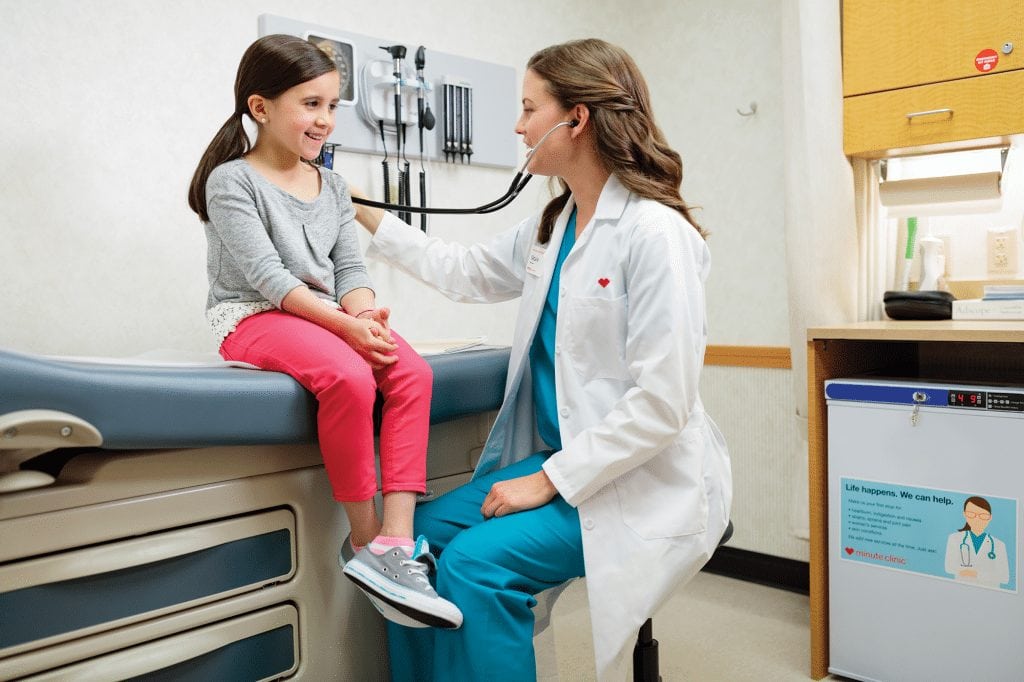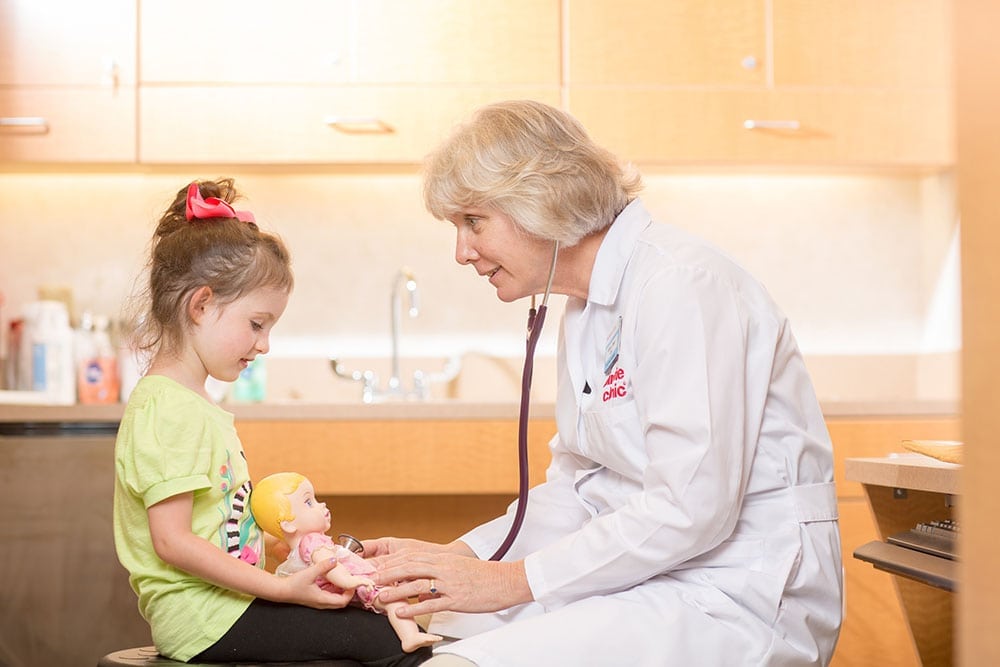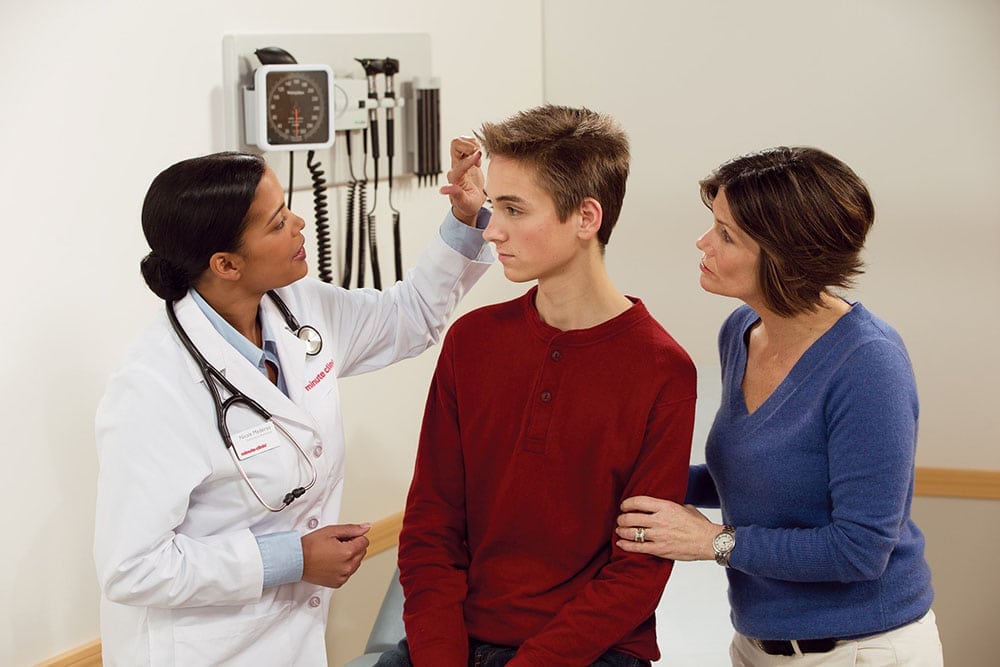
Checkups and immunizations are an important part of getting ready for the new school year. PHOTOS COURTESY MINUTECLINIC
It seems like only yesterday that our children were wrapping up their last day of school and heading off to the pool, summer camp and family vacation. But the new academic year will soon be here, and it’s time to think about what’s needed to prepare them for a safe and healthy start in the classroom.
From obtaining required vaccinations to teaching kids basic hygiene habits and helping teenagers cope with acne, taking care of our children’s health is always challenging.
Here are some tips to make your job a little easier.
Sports and School Physicals
Increasingly, students are required to obtain exams and physicals at the beginning of the school year.
For middle and high schoolers, a sports physical is needed before student athletes can practice and play interscholastic sports. These exams assess your child’s physical condition and ability to participate in sports, and determine any issues that would put them at risk.
For college freshmen, many schools also require a physical prior to enrollment, so be sure to check admissions requirements in advance.
Immunizations
It is important to make sure your student is up to date on required vaccinations. Immunization schedules are standardized based on the CDC’s recommendations, however, if you recently moved to California, there might be additional local requirements to consider for your child. You can review these on the California Department of Public Health website.

Even preschoolers can learn some basics about health and hygiene.
Children entering kindergarten or elementary school must be current on doses of their early-age vaccinations, which include DTaP (diphtheria, tetanus and pertussis or whooping cough), Hepatitis B, IPV (Polio), MMR (measles, mumps and rubella) and Varicella (chicken pox). Students who have never attended a California school must also present written evidence of a Mantoux (PPD) Tuberculin skin test (preschools will have their own requirements pertaining to the test).
For seventh graders, a Tdap vaccination (also for diphtheria, tetanus and pertussis) is required prior to beginning the school year. This is a booster immunization indicated for adolescents and adults that follows the earlier DTap series received as a child.
The meningitis vaccine (protecting against inflammation of the protective membranes covering the brain and spinal cord) is recommended for ages 11-18 (first dose around age 11-12 and a booster at 16-18 before the period of increased risk). Adolescents who receive their first dose at or after age 16 do not need a booster dose. It is important to note that first-year college students living in residence halls are recommended to be vaccinated with meningitis.
TB testing for college entrance in California is based on identifying the student’s risk factors including travel or residence in a foreign country, close contact to someone with infectious TB and immunosuppression.
Remember to schedule appointments for exams and immunizations in advance because primary care providers often take summer vacation.
A retail clinic such as MinuteClinic, located in CVS Pharmacy stores throughout the state, is also a good option for school physicals and vaccinations. They are open seven days a week and accept most insurance. Always remember to bring your child’s vaccination record.
Hygiene Tips

Teens need immunization boosters, and possibly tips for managing acne.
Shortly after school begins, we see a steady stream of students with contagious conditions such as strep throat and conjunctivitis (pink eye). That’s why I always encourage parents to stress basic hygiene and germ prevention, especially with young ones heading off to preschool and kindergarten for the first time.
Teach your children to wash their hands with soap and water for 20 seconds after using the restroom and before they eat.
Show them how to sneeze into their sleeve – not their hands – or to cover their nose and mouth with a tissue and throw it away afterward. Make sure they know not to share drinks in the cafeteria or water bottles on the playground – also a good reminder for older students, particularly if they play on sports teams.
Lastly, caution them about sharing hats and towels, both common ways for lice to spread. Locker room towels can also be a breeding ground for a variety of bacteria including MRSA (a.k.a. the super bug), which is responsible for several difficult-to-treat infections that affect various parts of the body.
Acne
Acne is an emotional issue for many adolescents and may affect their self-esteem as they begin classes in the fall. Changes in hormones, stress and certain medications and cosmetics can be triggers.
A combination of over-the-counter products and prescription medications may be needed to achieve clearer skin. In addition, there are some steps they can take to help remove excess oil and old skin cells, and promote new skin growth.
First, consider a shorter hair style. Long hair can cause skin to be oiler; especially if it hangs in your child’s face, goes unwashed or if they sweat a lot. Use gentle shampoos and conditioners and avoid gels and oils that can get in their face and clog their pores.
Next, be mindful of areas where tight-fitting items rub the skin and cause irritation. This includes helmets for sports, headbands, bra straps and high-collared shirts and sweaters.
Daily face washing is important, but keep it gentle. Heavy scrubbing, harsh soaps and hot water can cause acne to get worse. Avoid make-up whenever possible and always make sure it’s removed at the end of the day.
Here’s one final tip for students of any age: Approach the journey back to school, starting on Day One and every day after, with encouragement, motivation and plenty of hugs. A positive attitude always contributes to good health!
Mary Hull is a mother of three living in San Dimas and a Family Nurse Practitioner at Minute Clinic locations in Burbank and Pomona. MinuteClinic offers physicals at locations inside select CVS pharmacy stores in Los Angeles, Orange, Riverside and Ventura counties.




























